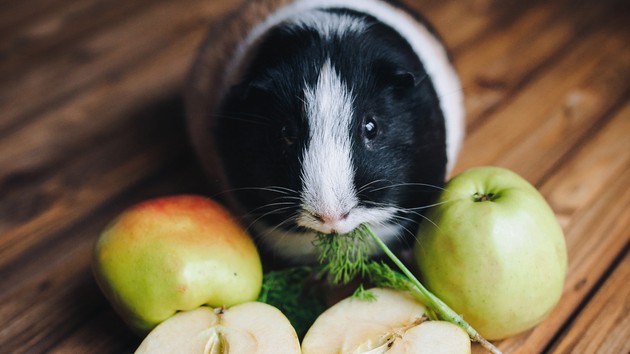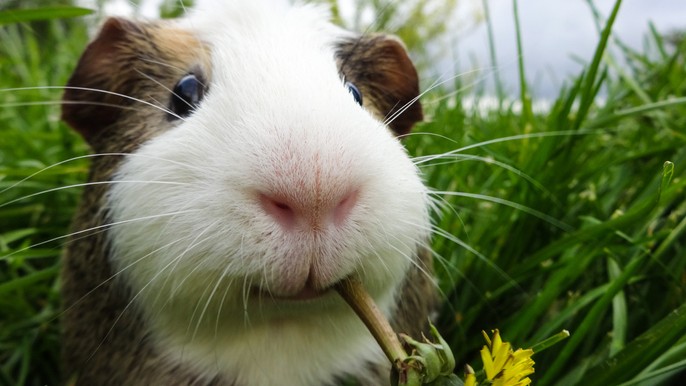Can guinea pigs eat grapes? Six guinea pig nutrition questions answered
Can guinea pigs eat grapes? We answer your questions on the optimal diet for guinea pigs

Get the best advice, tips and top tech for your beloved Pets
You are now subscribed
Your newsletter sign-up was successful
"Can guinea pigs eat grapes?" may not be the first question you ask as the owner of a guinea pig, but you may well have found yourself wondering how to provide the best possible nutrition for your furry friend.
Guinea pigs are true herbivores, which means their natural diet is entirely plant-based. In addition to a high-quality commercial diet that is specifically formulated for guinea pigs, there are many supplemental items that your guinea pig requires for optimal nutrition and health.
These items include high-quality grass hay, vegetables and a Vitamin C supplement. In addition to these items, you may also choose to offer occasional fruits or legume hay as a special treat.
Compared to dogs and cats, who do well on just a commercial diet, guinea pig nutrition can seem overwhelming. Here, we’ll answer some questions about guinea pig nutrition, including the question, “Can guinea pigs eat grapes?”
- Best guinea pig accessories: Keep your cavy content
- Best outdoor hutches: five star accommodation for guinea pigs & rabbits
- Best rabbit runs (also suitable for guinea pigs)
- Best hamster toys: Amazing accessories for a happy hamster
- Pets at Home Foxglove Guinea Pig & Rabbit Hutch review
1. Do guinea pigs need to eat a commercial, pelleted diet?
A diet that is specifically formulated for guinea pigs will be primarily grass-based, with the addition of necessary vitamins and minerals. In general, a commercial guinea pig diet should contain approximately 16% fiber and 20% protein.
Guinea pigs are prone to obesity if they are overfed, so it’s important to offer measured meals and monitor your guinea pig’s body condition. A large amount of food is not necessary; ⅛ of a cup per day is sufficient for most guinea pigs (unless they are pregnant or nursing).
2. Do guinea pigs eating a high-quality diet need Vitamin C supplementation?
Like humans, guinea pigs are unable to produce their own Vitamin C. Therefore, guinea pigs must take in approximately 25-50mg of Vitamin C per day in their diet, to meet their body’s needs. If your guinea pig is sick or stressed, they will require even larger quantities of Vitamin C. Signs of Vitamin C deficiency, also known as scurvy, can occur within a few weeks. If left untreated, this condition can be fatal.
Get the best advice, tips and top tech for your beloved Pets
While commercial guinea pig food does contain Vitamin C, this vitamin is unstable and degrades over time. Much of the Vitamin C that was initially added to the food may be lost by the time you purchase the food off the shelf. Vitamin C loss will continue to accelerate once the packaging is open, especially if the food is stored in a moist location or exposed to light.
Given the necessity of Vitamin C and its instability in food, all guinea pigs require supplementary Vitamin C. You don’t need to worry about giving your guinea pig too much Vitamin C because it is a water-soluble vitamin and any excess Vitamin C will be excreted in the urine.

3. What is the best way to ensure a guinea pig receives adequate Vitamin C?
There are several effective ways to supplement your guinea pig’s Vitamin C intake. One option, used by many guinea pig owners, is to add Vitamin C drops to the water. If you use this approach, the water must be changed daily (with new Vitamin C drops added), because Vitamin C breaks down quickly in water.
Additionally, it’s important to ensure that your guinea pig is drinking enough. Some guinea pigs don’t like the taste of Vitamin C supplements; these guinea pigs may refuse to drink and become dehydrated.
A better alternative is to offer your guinea pig fruits and vegetables that are high in Vitamin C, on a daily basis. Examples of high-quality foods that are high in Vitamin C include guava, broccoli, cauliflower, red and green peppers, kale and strawberry.
Citrus can be administered occasionally as a special treat, but the high levels of sugar and acid that are found in citrus fruits make them inappropriate for daily feeding.
4. Do guinea pigs need hay as a regular part of their diet?
Guinea pigs need constant access to hay. Hay serves several important roles in guinea pigs. It keeps the intestinal contents moving normally through the gastrointestinal tract. Second, chewing hay ensures that the teeth wear down appropriately and don’t become overgrown. Finally, chewing hay can help prevent boredom for your guinea pig.
Hay should constitute at least 40 to 50% of your guinea pig’s diet. There are many different types of hay that you can use, including timothy, orchard, oat or meadow hay. Legume hay, such as alfalfa or clover, is loved by many guinea pigs and can be fed in limited quantities as a special treat. However, legume hay contains protein and calcium levels that are too high for everyday feeding.
5. Should guinea pigs eat fruits and vegetables as a regular component of their diet?
In addition to a pelleted diet, a Vitamin C supplement, and hay, your guinea pig should eat vegetables regularly. These vegetables provide a source of both fiber and nutrients.
Optimal vegetables for guinea pigs include collard greens, dandelion greens, lettuce, chicory, chard, and broccoli. Some of these vegetables are also a good source of Vitamin C. A typical adult guinea pig should be fed ¾ to one cup of vegetables per day.
Small quantities of fruit can also be offered as a treat for your guinea pig. Fruit should only be provided in small amounts because they are high in sugar and low in nutrient value.
6. Can guinea pigs eat grapes?
Unfortunately, there’s no easy answer to this question except 'we think so'. In recent years, we have learned that eating grapes can cause kidney failure in some dogs. We don’t know why this occurs or whether any other species are susceptible to these effects.
There’s currently no evidence that grapes can have similar effects on guinea pigs. But, at the same time, we can’t definitively say that grapes won't affect their kidneys.
Additionally, there’s another concern with feeding grapes to your guinea pigs. Grapes are high in sugar, especially green grapes, which leads many exotic animal veterinarians to view them as a source of 'empty calories' in guinea pigs. It’s probably okay to feed grapes as an occasional treat, but they should not constitute a regular part of your guinea pig’s diet.
Keep it simple
Although feeding a guinea pig may seem challenging, it’s easy to create a simplified daily feeding program. Give them a high-quality commercial diet, formulated specifically for guinea pigs, but also offer unlimited access to appropriate hay.
Finally, offer vegetables that are high in Vitamin C once or twice daily. Additional treats can always be added, but these basic ingredients form the framework of a healthy guinea pig diet.
Dr. Barnette is a graduate of the University of Florida, where she received both her B.S. in Zoology and her Doctor of Veterinary Medicine (DVM). She has 15 years of clinical experience as a small animal veterinarian, treating dogs, cats, and occasional exotic patients. She now works as a freelance veterinary writer, creating educational content for veterinarians, veterinary team members, and dedicated pet owners. Dr. Barnette lives in southwest Florida with her husband and daughter (plus two cats, a dog, and a rescued dove!) and enjoys kayaking, biking, and hiking. Learn more about Dr. Barnette at www.linkedin.com/in/catherinebarnette.

